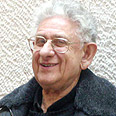
Elyakim Haetzni
צילום: דן בלילטי
Dialogue to nowhere
Elyakim Haetzni’s meeting with Arab students convinces him conflict can’t be resolved
I was invited to speak to a mixed group of Jewish and Arab youth, all citizens of Israel. This is the type of “dialogue” that leads nowhere. In this meeting, an Arab female student made a significant contribution after speaking out candidly and in line with a firm worldview.
I bid them farewell with a feeling that there is nothing to talk about, and that agreeing to disagree is the lesser evil.
The discrimination, said the Arab student, is not the problem. Even if you grant us full equality, the conflict will go on as long as Israel is a Jewish state. This country was our home, and you turned it into a foreign place for us. In a Jewish state we will always feel like foreigners: The Star of David is not our flag, and HaTikva is not our national anthem. It is impossible to replace our Palestinian dream by a Zionist dream.
These words, which were uttered calmly, put an end to the internal Jewish debate at once. Burning issues such as “territories” and “settlements” suddenly became irrelevant. I realized that the Hamas spokesman, who refers to the southern town of Sderot as a “settlement,” gives expression to a deep sense felt by all – Hamas, Fatah, Israeli Arabs, and Palestinian Authority residents.
I recalled the refusal of our “partner,” Mahmoud Abbas, to recognize the Jewishness of the state – a position that was openly backed by Egypt. This shows us that it is possible to sign a “peace treaty” with the State of Israel while at the same time fight against the fact it belongs to the Jewish people.
With the help of the Arab girl, the layers of dishonesty disappeared and I responded to her that we do not need her to “recognize our existence” – if we exist, her recognition won’t add a thing, and if we do not exist, her recognition won’t help. As recognition is not some kind of merchandise, there is no need to pay for it.
The Left asks the Arab girl to give up Jaffa, and in exchange is willing to give up Hebron. Yet even if she signs such deal a thousand times, it is clear that she would take Jaffa back as well once she is able to do so. And still, even such meaningless signature is incredibly difficult for her and she may even pay with her life for doing that - because a de facto reality is tolerated by the Arabs, in the absence of any other option, while a formal de jure concession is considered treason.
Modus vivendi
And if an agreement is impossible, there can be no meeting of the minds between side A that does not reconcile itself to the existence of side B, so there is no point in negotiations and a process of give and take – particularly the “give” part of the equation.
The student expressed an authentic Arab position, which the Jewish Left has been ignoring: A complete rejection of the “1967 in exchange for 1948” formula: You will concede what we already occupied and expelled and settled in the 1948 War of Independence and we will concede what we took in the 1967 Six-Day War. An Arab “partner” who pays some lip service to such “deal” is simply deceiving us.
This explains the Arab emphasis on two of the “core issues” – Jerusalem’s Old City, because the Jewishness or Arabness of the entire country is determined based on this, and the demand to allow millions of refugees into a Green Line state, which would erase Israel’s blue-and-white character.
This was well expressed by Azmi Bishara, an enemy who did not hide the truth from us: “The Palestinian conflict should be brought back to its roots – the refugees of 1948. The PLO was established in 1964 in Jerusalem, which was under Arab rule at the time, rather than Zionist rule. The PLO was established for the sake of refugee rights. These rights come before the right to a state. We have no interest in a state without the right of return.”
In conclusion, I proposed to the Arab student that we should make do with a modus vivendi: Co-existence with disagreement, without wasting time on illusions and blood on futile and frustrating attempts to resolve a conflict that can only be managed, at most.
People learn to deal with inherent contradictions in their personal lives as well. The Jewish-Arab conflict is chronic; a reality that cannot be changed in our time. Yet people can live long lives with chronic diseases too, while resorting to a forced “solution” could lead to a tragic end.










